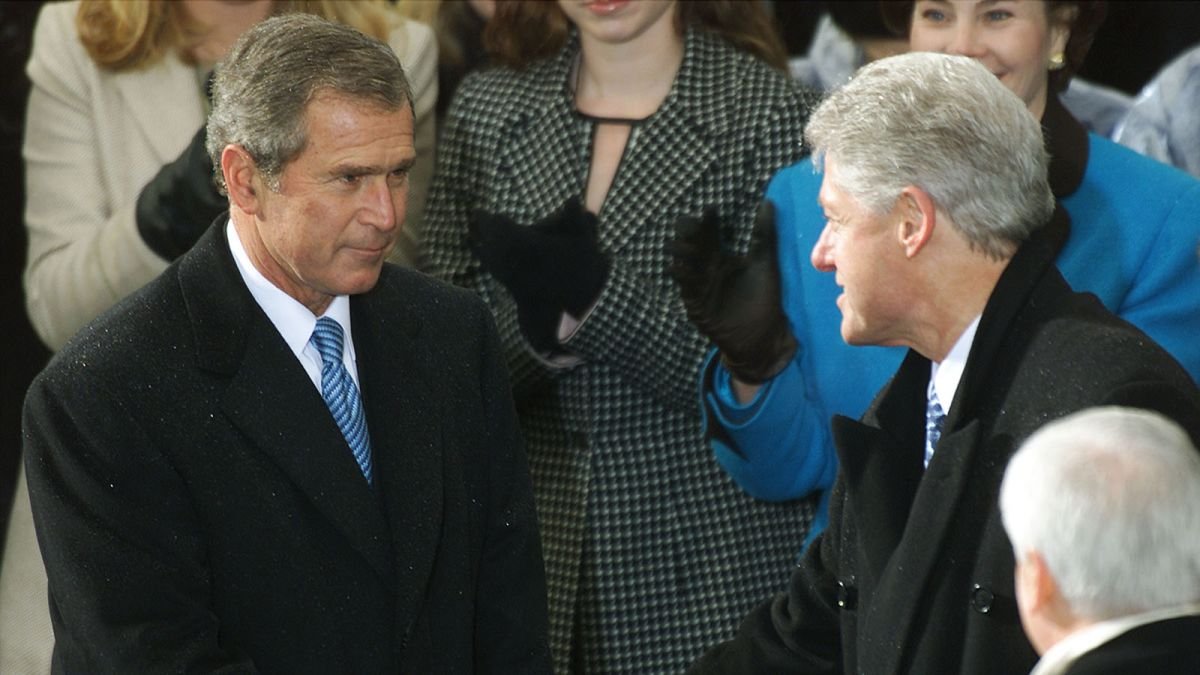The Power of Letting Go: Why Peaceful Transitions Define America
At the peaceful transition of power on January 20, 2001, outgoing President William J. Clinton shakes hands with his successor, newly-elected President George W. Bush. ;
When George Washington stepped down as America’s first president 227 years ago, he set a precedent unheard of in a world ruled by monarchs and emperors. What he was doing was virtually unheard of; The leader of a country was voluntarily giving up that power, and a new person was taking it. This transition didn't happen at the point of a gun, but through a democratic process wherein he willingly stepped down and allowed whomever the people of the country picked to be the next leader.
The first Presidential election I can remember was in 1988, when George H.W. Bush defeated Michael Dukakis, a man my mother had actively campaigned for. I was a little kid, and I remember my mother being disappointed, but she pulled me aside and explained to me what made America great in the first place.
We were about to have a peaceful transition of power. Democracy in this country worked yet again, just as it always had, and this is what made the United States the shining beacon of democracy for the entire world.
Furthermore, we may not always agree with the President, but there are three branches of government to keep him in check, there are laws to protect the people, there are advisors and committees and civil servants, of all political backgrounds, who put country before party, and there is the Constitution that has never failed us.
Never, not once, not even during our most contentious political debates, had violence marred that transition. Even during the 200 election, where the outcome was determined by the Supreme Court, the American people accepted the outcome even if they disagreed with it and George W. Bush became, unquestionably, the President. Even during the Civil War, that nearly ripped our country apart, the integrity of the election itself was never challenged. Those who opposed Abraham Lincoln did not try to steal the election, they believed they could no longer work with their fellow countrymen in the North and so it was time to break away. Even on what could have been this country's death bed, democracy survived.
There had always been a peaceful transition of power in the United states. On this, my mother taught me, we could count.
45 men have held the office of President of the United States of America. There have been 59 separate inaugurations, since many Presidents have served two terms, and there have also been several Vice Presidents who have had to be inaugurated because the President died or stepped down. And each and every time the torch has been passed the world could have confidence that the system would not fail.
Every time, that is, until January 6, 2021, when Donald Trump propelled a mob of his angry and armed supporters to storm the Capitol and stop the Senate and Mike Pence from certifying the election.
The election is eight days away, and the polls, deeply flawed as they are, tell us that the fate of this country will come down to a relatively small number of states that are nearly deadlocked. Trump, Vance, and their supporters have already told us that they do not recognize the legitimacy of the last election, have already lied about the electoral process this time, and have already laid the groundwork for the next January 6. This time they'll be ready. Whether they win or not, they have dedicated themselves to retaining power for generations and undermining democracy in the process.
It doesn't have to be this way. Voters can refuse to vote for someone like Donald Trump, someone who is willing to destroy the rule of law just to gain power, someone who has no interest in relinquishing that power even if they eventually leave office.
This election isn't just about selecting a president; it's about preserving the very foundation of our democratic system. Voters must prioritize candidates who respect and uphold our electoral process, regardless of outcome. They must reject those who sow doubt, spread misinformation, and threaten the integrity of our elections.
The eyes of history are upon us. Let us rise to this moment, safeguard our democratic institutions, and prove once again that the American experiment in self-governance can withstand even the most severe tests. Because if we fail in this crucial task, the repercussions will echo far beyond this election, potentially altering the very essence of what it means to be American.

